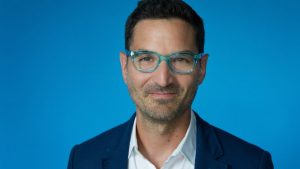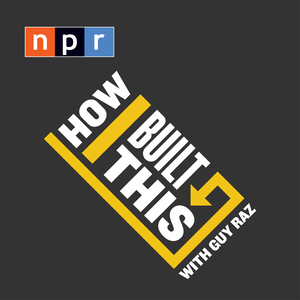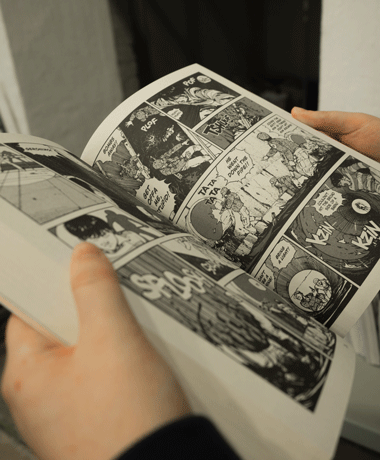When great human stories combined with masterful interview style and storytelling—mini masterpieces are made. This is a story about Guy Raz and his podcast, How I built this.
In one of iTunes most ever listened to podcasts, How I built this, Guy Raz sits down with the brains (and voices) behind some of the worlds biggest brands. With these innovators, entrepreneurs and idealists, he dives into fascinating stories and the results deliver an insight into businesses where it feels like a microphone just happens to be present.
Guy has spoken to everyone including LinkedIn’s creator Reid Hoffman to Virgin Media’s Richard Branson, Kate Spade founders Kate and Andy, and Ben & Jerry’s Ben and Jerry. He delves into the love, loss, failures, grit and unshakable faith of these stories.

But Guy has an equally as intriguing story of perseverance, dedication and passion, to be told.
His Story
Guy discussed his career, the podcast, future plans, obstacles and advice in an interview with Forbes in 2017. Having joined the National Public Radio (NPR) as an intern in 1997, over the next few years he diligently worked nearly every job in the newsroom.
One of Guy’s first jobs in journalism was as a war correspondent. His originally pursued the field in order to try and make a difference in the world. His career in journalism also led him to teach at universities such as Princeton, Georgetown and George Washington University.
Soon, however, he became frustrated as he felt he was leaving his readers and listeners disempowered. So, when a new opportunity cropped up he took it—not knowing then what doors it would open for him.
NPR collaborated with TED (of TED Talks) to develop the TED Radio Hour and its success of over 120 million downloads showed Raz that podcasting was the way forward.
How I built this

Having come from an entrepreneurial family, he was always surrounded by inspiration. Guy longed to be part of something optimistic and wonderful, finally, after much time spent thinking and the beloved podcast How I Built This came to fruition.
Believing podcasting to be a fresh way of connecting with audiences, Raz loves the, somewhat, lack of time constraint and the commitment from listeners. Speaking about podcast listeners, he states he finds them much more committed than radio listeners and prefers the familiarity.
Despite this difference, however, he does think the principles of radio and podcasting are still similar; its all about finding something interesting to talk about, making a great experience for the audience, and engaging each listener with a personal connection.
Apart from already running two businesses, How I Built This being one, he is constantly thinking up new ideas. He plans to grow as many great quality and sustainable shows as possible.
The key to success is echoed in his shows that are already up and running, which proves his finger is on the pulse of what is important in podcasting. Guy knows without quality, there would be no audience, and without an audience, there would be no show.
He also finds gratification in the fact that he can produce shows that he loves—that also happens to attract a huge listenership. One of his biggest beliefs is that podcasting is the future of audio and is certainly leading the way.
Although it all sounds very easy, he is familiar with the obstacles faced by those who take the entrepreneurial leap. Most often people consider security, or lack thereof, as one of the biggest risks.
Having fixed expenses and commitments is something that cannot be ignored. He has seen these fears and that bravery again and again, not only in those he interviews or with himself, but also with this own family. His father left his secure job at forty, and his sister established a PR firm at the tender age of twenty-five.
Guy’s storytelling techniques
He is uninterested in the shining view from ‘the top’. What he is uninterested in is the tales of an unencumbered and effortless rise through the ranks. He wants a journey, a discussion, reflection and truth.
He delicately, but pointedly, discusses the downright failures and hard times of his subjects. He makes, what sometimes feels like only a face to a brand, feel wholeheartedly human, and a normal human at that.
This in itself is what makes his storytelling so brilliant. The way he gets the biggest brands of today to tell their tales. Not in a way that particularly glorifies them either.
As listeners we get the full picture. From that first idea to the first sale and all the bumps and bruises along the way. As a storytelling master Guy guides his guests, knowing what his listeners will want to hear.
So, what can he give us in terms of tangible advice? As an entrepreneur who tells the stories of other fellows so well. First, as he says in Forbes, being the first in and last out (a.k.a passion and hard work). Second, being mentored and soaking it all up all the information you can. Third, surrounding yourself with kind, passionate and creative people and being kind in return.
As he continues to stand behind great quality and emotionally engaging work, he will remain a force behind the storytelling so loved by everyone.
